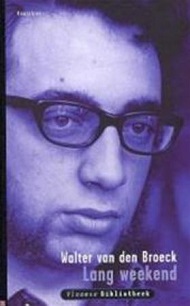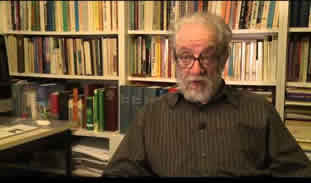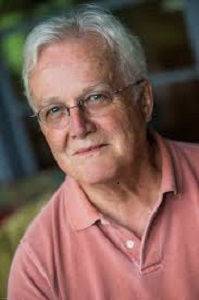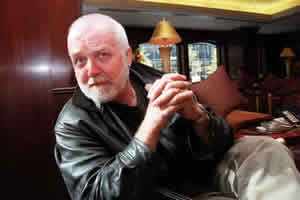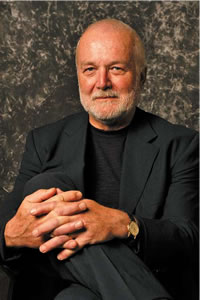De Nederlandse schrijver Joost de Vries werd geboren op 28 maart 1983 in Alkmaar. Zie ook alle tags voor Joost de Vries op dit blog.
Uit: Oude meesters
‘Sieger, wil je koffie?’ vroeg Mireille Beumer.
‘Nu even niet.’
Mireille Beumer – bijna ontroerde ze hem, hoe ze erbij zat. Bijna. Ingetogen glimlachend, rechte rug, haar handen voor haar buik gevouwen. Overgenomen van een bn’er-blad, momenteel chef Lifestyle maar belast met de taak een nieuw wekelijks katern voor de krant te bedenken. Zo smetteloos als ze eruitzag, zo correct, make-up, haar, outfit. Haar ambitie was zo evident. Iemand die zou proberen de Beste Leerling van de Klas te blijven, hoewel niemand nog cijfers uitdeelde. Ze speelde altijd precies de rol die van haar verwacht werd. ‘Vond je het een mooie dienst?’ zei Mireille. (aimabele gastvrouw.) ‘Alles wat gezegd moest worden werd gezegd.’ ‘Je bedoelt dat het iets voorspelbaars had?’ (serieuze interviewster.) ‘Zijn vrouw zei tegen me dat de uitvaart meer was voor de mensen die hem niet zo goed kenden, dan voor de mensen die hem goed kenden.’ ‘Als wij ons maar herinneren hoe Willem echt was.’ (oprechte rouw.) Hoe was zij echt? Ze schreef geen stuk in de lifestylesectie zonder even in een bijzin te vermelden dat ze een ‘single lady’ was, ze gebruikte termen als ‘nahuwelijk’, en ‘love life’. Sarie had haar een keer ontmoet op een feestje van een glossy waar ze ooit een klusje voor had gedaan. ‘Zij is al heel lang niet aangeraakt,’ was haar enige oordeel. (Sarie kon dat: iets zeggen alsof het de wet was. Ze keek erbij alsof ze vanaf de Tafelberg over de oceaan keek en ze iets leek te zien wat er altijd al was geweest, sinds het begin van de tijd.)
Heerlijk hoe ze het had uitgesproken, kin-duh-run, ze spuwde het uit alsof het de nieuwste in een serie oppervlakkige hypes was. Ergens in haar hart zat een gat zo groot als een babywagen. De eerste keer dat hij haar daarna sprak was ze weer fris en fruitig en deed ze alsof hun gesprek nooit had plaatsgevonden.
Maar liever haar maskerade dan Feiko’s ongemak. Hij zat daar aan die tafel met zijn pens naar voren waardoor je je afvroeg of de overbelaste knoopjes van zijn overhemd niet elk moment de lucht in konden worden gelanceerd.
‘Ik geef deze twee gewoon maar het woord,’ zei Anthony, die niet aan de tafel maar achter zijn bureau iets verderop ging zitten.
De twee keken elkaar even aan, en toen begon de spraakwaterval: We willen je even bijpraten en, als je het goed vindt, even je advies inwinnen, zei Mireille.”
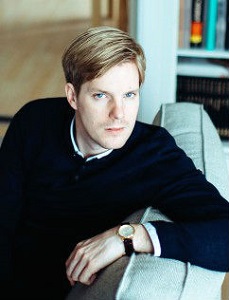
Joost de Vries (Alkmaar, 28 maart 1983)
De Vlaamse roman- en toneelschrijver Walter van den Broeck werd geboren in Olen op 28 maart 1941. Zie ook alle tags voor Walter van den Broeck op dit blog.
Uit:Een lichtgevoelige jongen
“Eerst dacht ik dat ze al wist wat mij was overkomen – moeders weten altijd alles – maar toen zag ik dat zij met haar gedachten helemaal bij vader was die minder jachtig zat te eten dan gewoonlijk. Zijn rechterslaap zag donkerblauw, zijn jukbeen had gebloed en was nu opgezet.
‘Elli, ik rijd straks eens naar Antwerpen’, had hij gisteren bij het middageten aangekondigd.
‘Zie maar dat ge op tijd thuis zijt,’ had moeder geantwoord, ‘ge staat morgen, met de vroege.’
Wanneer was hij thuisgekomen? Voor of na Ward Peeters en Frans Claes, die samen het lied van de kapotte pompbak hadden lopen lallen?
Tastend doopte hij soIdaatjes in een ei. Hij was zo te zien helemaal verdiept in de krant naast zijn bord.
‘Julius en Ethel Rosenberg.’
Die waren nu dood wist ik. Vader zou nu wel tevreden zijn. Dat zou hun leren atoomgeheimen aan de Rus te verkopen. Zo moesten ze allemaal varen, die smerige communisten. Was hij daarom nog altijd thuis? Om de dood van de Rosenbergs te vieren? Ik vond die Rosenbergs ook maar rare lui. Hij met dat brilletje en dat snorretje. En zij met die rare hoed, die hoge wenkbrauwen en dat zuinige mondje. Ze had iets van tante Leen uit Antwerpen. En welke vrouw heette er nu in godsnaam Ethel?
‘Staat hij van twee tot tien?’ vroeg ik. Hij hoorde me toch niet, hij was half doof, en als hij zat te lezen mocht de wereld vergaan.
Mijn zus Elvire schopte me onder tafel en lipte: Onnozelaar!
‘Heeft hij congé?’
‘Hij is vannacht tegen die paal aan de Tweede Halfstraat gelopen’, zei moeder. ‘Onze Staf zal meneer Timmermans bellen.’
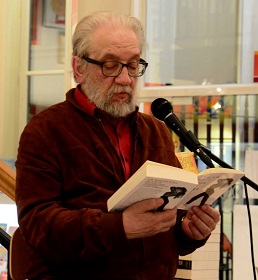
Walter van den Broeck (Olen, 28 maart 1941)
De Amerikaanse dichteres Ada Limón werd geboren op 28 maart 1976 in Sonoma, Californië. Zie ook alle tags voor Ada Limón op dit blog.
We Are Surprised
Now, we take the moon
into the middle of our brains
so we look like roadside stray cats
with bright flashlight-white eyes
in our faces, but no real ideas
of when or where to run.
We linger on the field’s green edge
and say, Someday son, none of this
will be yours. Miracles are all around.
We’re not so much homeless
as we are home free, penny-poor,
but plenty lucky for love and leaves
that keep breaking the fall. Here it is:
the new way of living with the world
inside of us so we cannot lose it,
and we cannot be lost. You and me,
are us and them, and it and sky.
It’s hard to believe we didn’t
know that before; it’s hard to believe
we were so hollowed out, so drained,
only so we could shine a little harder
when the light finally came.
Downhearted
Six horses died in a tractor-trailer fire.
There. That’s the hard part. I wanted
to tell you straight away so we could
grieve together. So many sad things,
that’s just one on a long recent list
that loops and elongates in the chest,
in the diaphragm, in the alveoli. What
is it they say, heart-sick or downhearted?
I picture a heart lying down on the floor
of the torso, pulling up the blankets
over its head, thinking this pain will
go on forever (even though it won’t).
The heart is watching Lifetime movies
and wishing, and missing all the good
parts of her that she has forgotten.
The heart is so tired of beating
herself up, she wants to stop it still,
but also she wants the blood to return,
wants to bring in the thrill and wind of the ride,
the fast pull of life driving underneath her.
What the heart wants? The heart wants
her horses back.
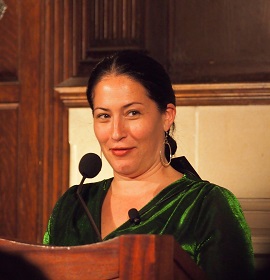
Ada Limón (Sonoma, 28 maart 1976)
De Peruviaanse schrijver Mario Vargas Llosa werd geboren op 28 maart 1936 in Arequipa. Zie ook alle tags voor Mario Vargas Llosa op dit blog.
Uit: Voor uw liefde (Vertaald door Arie van der Wal)
“Ze deed haar ogen dicht en luisterde: heel zwak maar regelmatig, zo klonk Chabela’s ademhaling. Ze sliep, droomde misschien, en dus was zij het ongetwijfeld zelf geweest die in haar slaap dichter naar het lichaam van haar vriendin was toe geschoven.
Terwijl ze zich verbaasd en beschaamd opnieuw afvroeg of ze wakker was of droomde, werd Marisa zich eindelijk bewust van wat haar lichaam al wist: ze was opgewonden. Die tere voetzool die haar wreef verwarmde, had haar huid en zinnen in vuur en vlam gezet, en als ze een hand tussen haar benen zou laten glijden, zou ze vast en zeker voelen dat ze nat was. Ben je gek geworden? zei ze bij zichzelf. Opgewonden raken van een vrouw? Sinds wanneer, Marisita? Natuurlijk werd ze in haar eentje ook vaak genoeg opgewonden, en ze had weleens met een kussen tussen haar benen gemasturbeerd, maar daarbij had ze altijd aan een man gedacht.
Voor zover ze zich kon herinneren nooit, maar dan ook nooit, aan een vrouw. En toch deed ze dat nu wél, ze trilde van top tot teen en verlangde er hevig naar dat niet alleen hun voeten elkaar raakten maar ook hun lichamen en dat ze, net als op haar wreef, overal de nabijheid en warmte van haar vriendin zou voelen.
Heel voorzichtig, met bonzend hart, zodanig ademend dat het leek alsof ze sliep, schoof ze een stukje op, totdat ze, ook al raakte ze haar niet aan, merkte dat ze zich nu op hoogstens enkele millimeters van Chabela’s rug, billen en benen bevond. Ze hoorde haar duidelijk ademen en meende een verborgen uitwaseming te bespeuren, die opsteeg uit dat zo nabije lichaam en haar volledig omhulde. Haast werktuiglijk, alsof ze zich niet bewust was van wat ze deed, strekte ze haar rechterhand uit en legde die op de dij van haar vriendin. Leve de avondklok, dacht ze. Ze voelde haar hart sneller kloppen. Chabela zou wakker worden en dan haar hand wegduwen: ‘Wat doe je? Raak me niet aan. Ben je gek geworden? Hoe haal je het in je hoofd.’ Maar Chabela bewoog zich niet en leek nog altijd diep in slaap. Ze hoorde haar in- en uitademen en het was net of die lucht naar haar toe kwam, haar neus en mond binnendrong en haar inwendig verwarmde. Opeens, in al haar opwinding, en dat was echt absurd, moest ze denken aan de avondklok, de stroomstoringen, de ontvoeringen – vooral de ontvoering van Cachito – en de bommen van de terroristen. Wat een land, wat een land!”
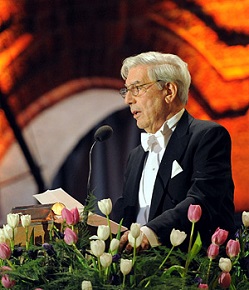
Mario Vargas Llosa (Arequipa, 28 maart 1936)
De Nederlandse dichter en schrijver Chrétien Breukers werd geboren op 28 maart 1965 in het Limburgse Leveroy. Zie ook alle tags voor Chrétien Breukers op dit blog.
Uit: Een zoon van Limburg
“De winst ging naar de Hollanders, althans, zo wordt dat in Limburg gezien. En alle bossen die moesten wijken voor de inmiddels verdwenen welvaart? Die bossen waar een onbegrijpelijk provincie-omspannend snelwegennet voor in de plaats is gekomen? Ze zijn weg en blijven weg, en maken van Limburg een doorgangsweg, een geasfalteerde route richting Duitsland, België en het hart van Europa.
De Limburger vertrouwt het allemaal niet, wat zeg ik? Hij heeft het nooit vertrouwd. De hoge heren zitten met hun handen aan zijn dochter en in zijn portemonnee, de burgemeester maakt vuile zaken met provincie en rijk, de fabrieksdirecteur is alleen maar uit op winst en aanzien. En de kleine man? Die kan zich kapotwerken. Vroeger totdat hij stoflongen had of was bezweken onder het boerenwerk, nu totdat hij met AOW en pensioen wordt afgedankt. De Limburger voelt zich genaaid, door alles en iedereen. Daarin heeft de gemiddelde Limburger wel iets van een Surinamer. Hij komt uit een kleine wereld die voornamelijk is gedefinieerd vanuit negatieve gevoelens over de machthebbers. Dit is natuurlijk niet de hele waarheid. Limburgers voelen zich – bijvoorbeeld in culturele zin – wel degelijk met elkaar verbonden. Uiteraard zetten ze zich daarbij af tegen Holland, dat vreemde gebied ergens in de verte, maar de ligging van de provincie vergemakkelijkt samenwerking met Belgen en Duitsers. Er is nog een ander moment waarop Limburgers zich verbonden voelen met elkaar – als ze in het gezelschap zijn van Hollanders. Want niets schept zo’n band als de omgang met de natuurlijke vijand en bond- annex landgenoot. Limburg en de Limburgers bestaan vooral als ze hun plaats moeten bepalen jegens de dierbare vijand, van wie ze zelf deel uit-maken.
Het schrijven van ‘mijn’ verhaal, mijn verhaal over Limburg, heeft therapeutische bijverschijnselen gehad: ik voel me nu meer een Nederlander en tegelijkertijd meer een Limburger dan ooit. Een effect dat ik vooral de Limburgse lezers van dit boek van harte toewens. Helaas wil dat niet zeggen dat Limburg daardoor ineens bestáát. Zoveel toverkracht is het geschreven woord niet gegeven.”
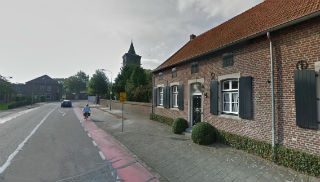
Chrétien Breukers (Leveroy, 28 maart 1965)
Leveroy, Kerkstraat
De Nederlandse fotograaf en schrijver Steye Raviez werd geboren in Amsterdam op 28 maart 1943. Zie ook alle tags voor Steye Raviez op dit blog.
Uit: Spion
“Pos wilde onder geen beding hele of halve sympathisanten van nazisme of fascisme op het congres een podium bieden. Hij streefde veel meer naar een open discussie tussen communistische en niet-communistische filosofen. Er waren de on-vermijdelijke anekdotes.
Volgens een zekere Stuttenheim, voorzitter van de sectie taalfilosofie, waren lang niet alle filosofen in het gezelschap vakbekwaam.Stuttenheim tegen Pos:‘Ik sta op een morgen een kopje koffie te drinken. Staat er een mannetje naast me. Hij kijkt me aan en zegt:“Einstein heeft het nooit begrepen.”Ik zeg:“Wat heeft hij nooit begrepen?”“Dat van die getallen.”Ik zeg: “Van die getallen?”“Nou,” zegt dat mannetje, “je hebt mannelijke en vrouwe-lijke getallen en dat mannelijke kristalliseert zich in het vrou-welijke en dat vrouwelijke manifesteert zich in dat mannelijke.”Toen heb ik mijn kopje koffie neergezet en ben weggelopen, want ik denk: over twee seconden steekt hij weer van wal. Nou wil ik dat ’s avonds aan Pos vertellen en zeg:“Pos, ik heb vanmorgen een krankzinnige ontmoet.”Kijkt die Pos me moedeloos aan en zegt: “Maar eentje?”’De anekdote sloeg gelukkig niet op mijn vader, maar hij zou wel in krankzinnigheid eindigen: midden jaren vijftig werd hij opgenomen in de psychiatrische afdeling van de Sint-Willi-brordusstichting te Heiloo. In medische rapporten uit die tijd was onder meer opgetekend hoe hij tijdens nachtelijke uren dikwijls amok maakte door spiernaakt en kabaal makend rond te struinen in de slaapzalen. Het was op schrijnende wijze dui-delijk hoe zijn geestelijk verval doorzette. Edouard weet zijn recalcitrante gedrag aan de broeders van het gesticht: zolang er familiebezoek was waren ze poeslief, maar zodra men de hielen had gelicht gedroegen ze zich hardvochtig. Hij zou Sint-Willi-brordus nooit meer verlaten.”
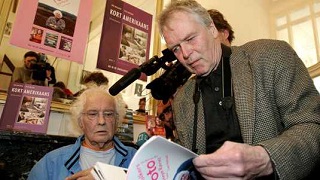
Steye Raviez (28 maart 1943 – 20 februari 2017)
Hier met Jan Wolkers (links)
De Amerikaanse schrijver Nelson Algren werd geboren op 28 maart 1909 in Detroit. Zie ook alle tags voor Nelson Algren op dit blog.
Uit: A Place To Lie Down
“The Negro wriggled his toes, in sleep. Tex’s own feet had gone sockless for months, he too was very tired; but even as he felt himself dozing off he became aware of someone coming toward him. Then a silver badge above small boots, a row of brass buttons and a neck on thighs swung up a winding cindered path twirling a club-on-a-cord like a swagger-stick. Tex saw him coming, shoved Mack, and ran. From behind the picket fence, safe outside, Tex watched. Boots budged Mack until he rolled over, moaning like a sick man. He was sweating in sleep, his mouth drooled saliva, then he woke with a start, his eyes bulging out; there was, for one moment, no flicker of understanding in his eyes.
“White folks’ park, nigger. Git a-goin’ ‘for ah fan yore fanny.”
He twirled his club-on-a-cord significantly, boy-fashion, threatening.
Tex waited on the street. He’d like to josh the nigger a little now. But when the Negro joined him they walked on silently, and Tex said nothing at all.
On a street lined with radios competitively blasting the air into splinters, they sat down on a Keep-Our-City-Clean box. Both were hungry enough to chew their tongues; but they were both too weary to think consistently even about food. Tex rested his feet on the curbstone and watched the gutterflow swirl past.
Much was being borne on that gutter-tide: a frayed cigarbutt came past first; then a red beer-cork; and then, its pages flung wide in a disgraceful death, a copy of Hollywood Gossip came floating by. It lay flat on its back, a whore-like thing. Tex sniped the cigar and the magazine, crushed tobacco onto a dry page, and rolled a rude cigarette. Smoking, he looked at the magazine’s pictures. One page bore a picture of Douglas Fairbanks, Jr., in a stovepipe hat, hugging two girls in onepiece bathing suits. Out of Fairbanks’s ears Tex fashioned four long cigarettes, but the figures of the girls in the bathing suits Tex McKay preserved, studying them as he smoked.
The cigarettes were strong, hence good; he offered Mack one, but the boy shook his head as though he were too tired even to smoke. To make a few more, Tex ripped one of the bathing girls up the middle. He had an odd feeling when he did that, and looked through the book for more bathing girls’ pictures; but there was no other dry page, and he began to feel tired again.”
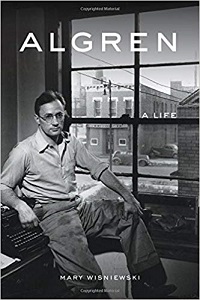
Nelson Algren (28 maart 1909 – 9 mei 1981)
Cover biografie
De Zweedse schrijfster Marianne Fredriksson werd geboren in Göteborg op 28 maart 1927. Zie ook alle tags voor Marianne Fredriksson op dit blog.
Uit: According to Mary Magdalene (Vertaald door Joan Tate)
“Mary had a great deal to do. Leonidas was to return home that day, thirsty, tired, and hungry. She put the great water pan to the fire and fetched water. As usual at the well, she glanced with gratitude up at the mountains in the south where Daphne’s springs leapt out of the rocks and supplied the town with an abundance of clear fresh water. They were expecting his sister in the afternoon. She was to bring the account book and the two of them were to sit at the big table to enter all the expenses and income from his journey. “Please, God, that trade was good,” said Mary, but her words were largely routine, an unnecessary invocation out into the air. She liked her sister-in-law, but feared those bold eyes that saw straight through you. Mary Magdalene had much to hide. She should have gone to the market the day before. Now she had to hurry down to the marketplace. She was in luck—a large piece of fresh lamb, some smoked fish, and a basket of vegetables and fruit. On her way home she passed the synagogue, and for a moment wished she could go in to Rabbi Amasya and tell him her story, but the thought was only random. She remembered her neighbor had said that Simon Peter and his companions were staying with the rabbi. She pulled down her headcloth and hurried on. She managed to clean the house and fill her jars with flowers from the garden, then finally combed her long hair and fastened it into a long plait round her head. A golden crown; she was proud of her hair. But she was troubled when she looked in the mirror and saw how wide-open her eyes were, dark shadows all around them.
……
When Leonidas arrived, the house smelled of spices, flowers, and roasting lamb. He sniffed at the aroma and laughed aloud with delight. As usual, he took her two hands in his. “Every evening on my journey” he said, “I try to remember how beautiful you are. But I have a poor imagination and you always surpass my images.” “Silly. I’m beginning to grow old.” “You’ll never grow old.” “The eyes of love,” she said, smiling, but then he noticed the dark circles around her eyes. “Mary, something’s happened.”
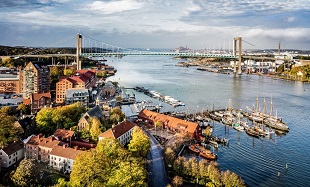
Marianne Frederiksson (28 maart 1927 – 11 februari 2007)
Göteborg
De Amerikaanse schrijver Russell Banks werd geboren op 28 maart 1940 in Newton, Massachusetts. Zie ook alle tags voor Russell Banks op dit blog.
Uit: The Angel On The Roof
“When I began writing nearly forty years ago, I wanted to be a poet, but had not the gift and fell in love instead with the short story, the form in prose closest to lyric poetry. Unable to court successfully the queen of the arts, I turned my attention to her lady-in-waiting. This is not a rare form of abandonment (as Faulkner famously observed, “All fiction writers are failed poets”), but in any event, it’s clear enough to me why I abandoned poetry early, almost too early to have failed at it, for the short story. Too many of my close friends at college and shortly afterwards obviously had the gifts (of language, wit, personal charm, good looks–whatever it took to woo and win the favors of the queen’s main muse), and by unavoidable comparison to poetry-writing friends like William Matthews, James Tate, and Charles Simic, I was tongue-tied, humorless, bad-mannered, and homely. No wonder I turned to prose fiction.
Before leaving, however, I did publish a fair number of those early poems in obscure–but not obscure enough- literary magazines and journals and published two chapbooks of poetry in small–but not small enough–editions. They show up now and then in the hands of collectors at book-signings, and it’s all I can do to keep from tearing the book from the collector’s hands and starting an auto-da-fe with it right there in the store. I’m not so much ashamed of those poor poems as embarrassed by the vanity of my youthful ambition, by its evident (to me, now) transparency, and am comforted a bit only by calling to mind Nathaniel Howthorne’s first book, an absolutely awful bodice- ripper entitled Fanshawe, self-published in an edition of perhaps 500 copies that he spent his life afterwards quietly seeking out, purchasing, and destroying by fire, in the process (since he got all but a handful of copies) making it one of the rarest, most expensive books in American literature.
Unable to cohabit with lyric poetry, I, like my illustrious ancestor, took up temporary residence instead with her nearest neighbor, the short story, and only later moved across town as he did, to settle more or less permanently, I thought, with the novel.”
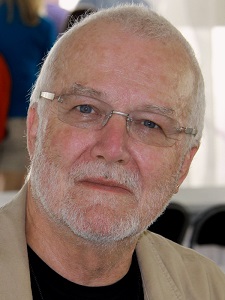
Russell Banks (Newton, 28 maart 1940)
Zie voor nog meer schrijvers van de 28e maart ook mijn blog van 28 maart 2017 en ook mijn blog van 28 maart 2016 deel 2 en eveneens deel 3.

